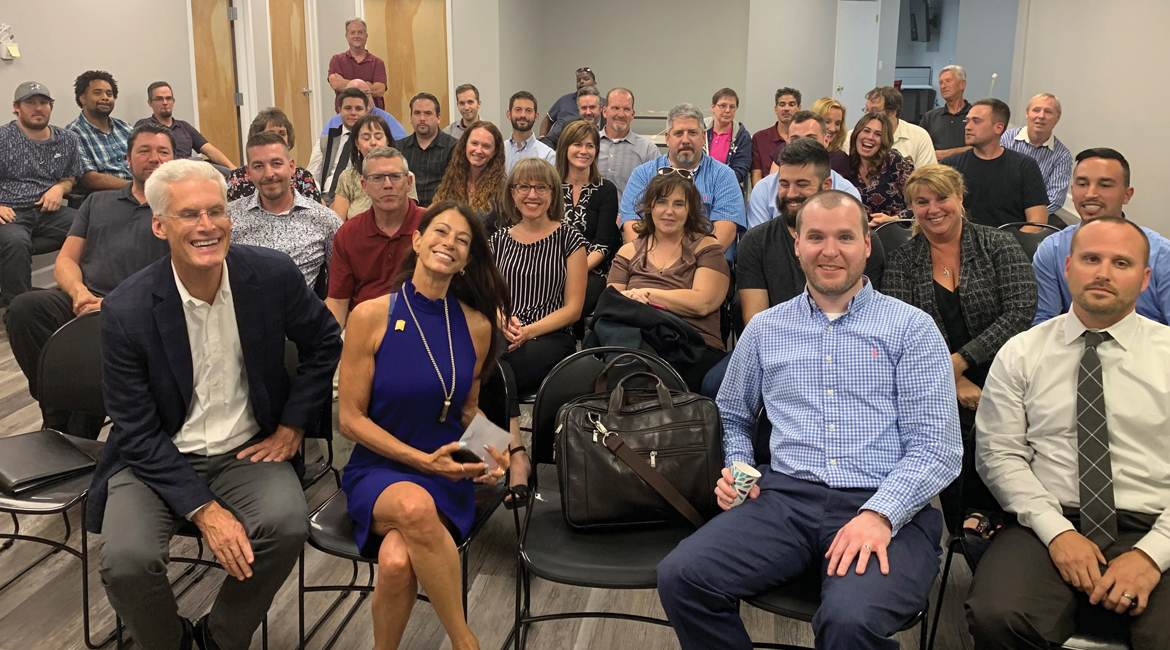Repeat Business Systems’ formula for thriving in tough times centers on creativity and finding the right people.
Above: The staff at Repeat Business Systems’ Albany branch gathers together for a company meeting. John (left) and Dawn Abbuhl (right) are seated together in the front row.
If the pandemic has made anything clear over the past couple of years, it’s that nothing’s more important than human connections. When Dawn Abbuhl, president of Repeat Business Systems (RBS) in Albany, New York, and her husband John first got the idea to start a company of their own, it was because they’d seen what goes wrong when a company is lacking in that department.
“He was the manager of an office when we met, and he felt like the service was not up to speed, and he was very embarrassed by it,” recalled Abbuhl. “I said we can do that! We can do a much better job.”
The two moved from Connecticut to New York, where John had roots, and she’d gone to school, and set up shop as Repeat Business Systems. That was in 1987, and over the last 35 years and 13 acquisitions, the company has grown to nearly a hundred employees working at four locations, with more growth on the horizon.
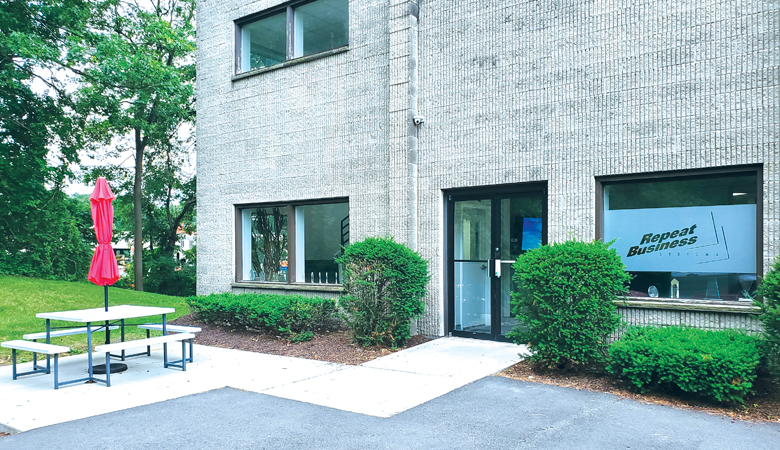
Above: Repeat Business Systems’ Albany headquarters.
“We were able to find these companies with amazing people,” said Abbuhl about the acquisitions. “Some people do acquisitions to have economies of scale, and they get rid of the staff. We didn’t do that. We’ve grown each company bigger than when we acquired them. That allowed us to hire the talented people that I call for advice, people that I respect and look up to.”
When COVID-19 broke out in early 2020, that human-centered approach helped Repeat Business Systems stay afloat, by helping their clients keep their heads above water too. For a time, the focus couldn’t be on making new sales or collecting on existing contracts. Abbuhl described that time as the biggest learning experience she had ever had.
“After about twenty minutes of panic, and I never panic, I realized this was an opportunity to get bigger and stronger and be a lot better when we were able to come online again,” she said. “We revamped our training, our products, and how our sales process worked. How we managed our current customers and how we managed our new customers.”
The advantage of a sudden slowdown in sales meant that there was bandwidth to try a completely different approach. With the goal of avoiding layoffs or furloughs, if possible, Abbuhl marshaled her staff to do research on new products and strategies to share with customers.
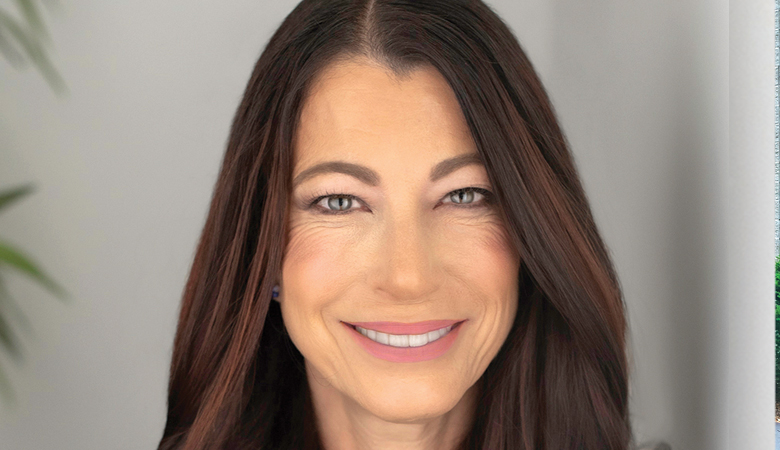
Above: Dawn Abbuhl
“Every single person was tasked to call every customer, starting with the largest and working our way down, asking ‘how can we help?’ We helped by donating machines to COVID tents, forgiving invoices, or [delaying payments] because customers didn’t have any money coming in either. We took the first month and said we’re not trying to sell anything; we’re just trying to help.”
Mentorship became the name of the game, especially with small businesses that were ill-equipped for such a sudden change in circumstances, especially the overnight shift to remote work. Abbuhl recalled helping a client on board 250 new laptops remotely so the company’s entire team could start working from home.
“Every business was in the same boat,” she said. “It was such an equalizer. I didn’t find it a challenge at all because like everything if you go into it sincerely and with an open heart, that’s what matters.”
Now that work is returning to, if not normal, at least something more familiar, nearly all of Abbuhl’s team is back in the office. Repeat Business Systems’ focus now is on tackling the double-headed dilemma of post-COVID life, staffing shortages, and supply chain slowdowns.
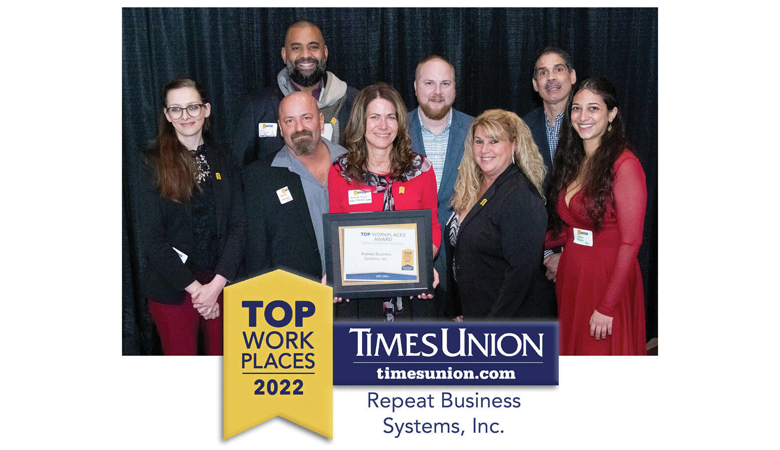
Above: RBS’s decades of being a good corporate citizen has helped its recruiting efforts, resulting in recognition as a Top Work Place in Albany for 2022.
Luckily, the decades of work RBS put into being a good corporate citizen have paid dividends in recruiting. Abbuhl referenced a recent hire who seemed overqualified, so much so that she was surprised at the job he was interviewing for, but he cited the company’s philanthropic record as the reason he wanted to work for Repeat.
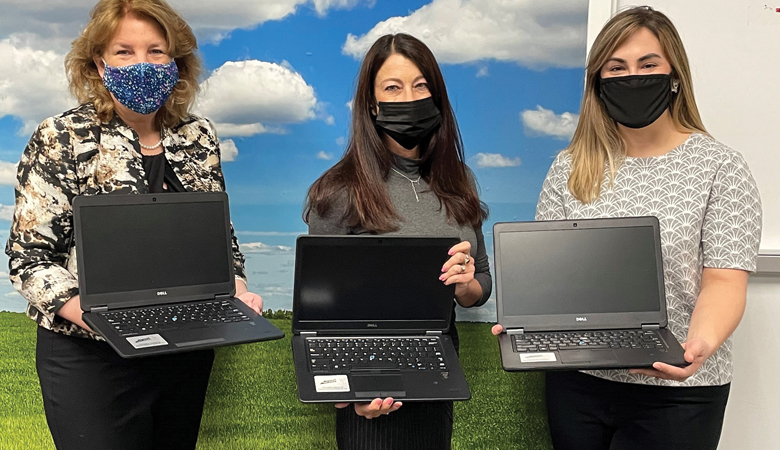
Above: Abbuhl presents laptops to the Capital District Women’s Employment & Resource Center doing COVID. The organization supports and helps women, who are often leaving an abusive relationship, to re-enter the workforce.
“I do think people are looking for different things, not stability or money necessarily,” she acknowledged. “They want to feel good about what they’re doing. They see life is short, and they want to be proud of who they are and what they have, and how they’re spending their time.”
RBS tries to reach as many potential applicants as possible, using recruiters, job listing websites, the local chamber of commerce, local colleges, and even word of mouth. Abbuhl also makes a point of approaching recruiting from angles not all companies think of, such as working with a friend who consults on diversity, ethics, and inclusion to reach a diverse population where they are, which may not be mainstream sites like ZipRecruiter or Indeed. Albany, where the company is headquartered, is a sanctuary city, so the local refugee center has contacts with many job seekers, as do other support organizations such as a resource center for women looking for aid in returning to the workforce.
“We have an extremely wide net,” said Abbuhl. “It’s diversity in every way: culture, age, viewpoint, sexual orientation, anything you can think of. If you hire everyone that looks the same and thinks the same, your ideas are going to be very consistent, and that’s never what has helped me.”
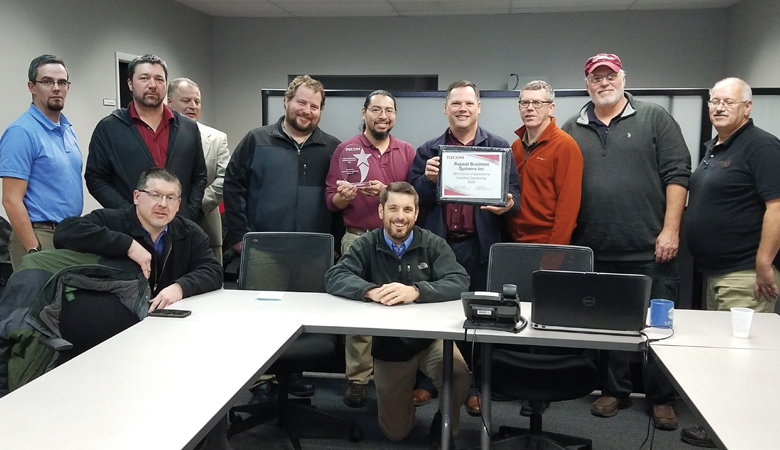
Above: Repeat’s service team proudly shows off the recognition they received from Ricoh Business Systems for outstanding service.
Having a wide-range of experience levels on her team has been a lifesaver during the seemingly never-ending supply chain crisis, which affects everything from replacement parts to top-line products. Repeat’s suppliers are in the same boat, with no clear cause to point to. Everything from COVID-related shutdowns in major producer countries like China to the disruptions caused by the war in Ukraine to domestic trucking shortages is a factor.
“Ricoh is our primary manufacturer, and their communication is fantastic,” said Abbuhl. “They’re doing everything they can. They’ve rerouted stuff and they’ve supplied refurbished equipment that we can use for emergencies.”
With no end to supply chain issues in sight, all Abbuhl can do for her customers is the same thing her suppliers do for her, get creative. Sometimes that means providing a refurbished piece of equipment to tide a client over until the one they ordered is available. Sometimes that means working with a manufacturer to provide a more expensive model at the contracted price just because that’s the one available, then figuring out how to absorb the costs. “I would rather under-promise and over-deliver,” she said.
Some of the necessary adjustments have even turned out to be better for clients in the long run, such as moving to cloud fax and storage solutions rather than waiting months for a traditional MFP. “We wouldn’t be crying about the supply chain if people weren’t buying things,” noted Abbuhl. “We’re finding better ways for customers to do things. Just like during the pandemic, this is an opportunity for us to get better. I have a really, really optimistic look for the future.”
_________________________
To become a subscriber, visit www.thecannatareport.com/register or contact cjcannata@cannatareport.com directly. Bulk subscription rates are also available upon request and included in our media kit.

